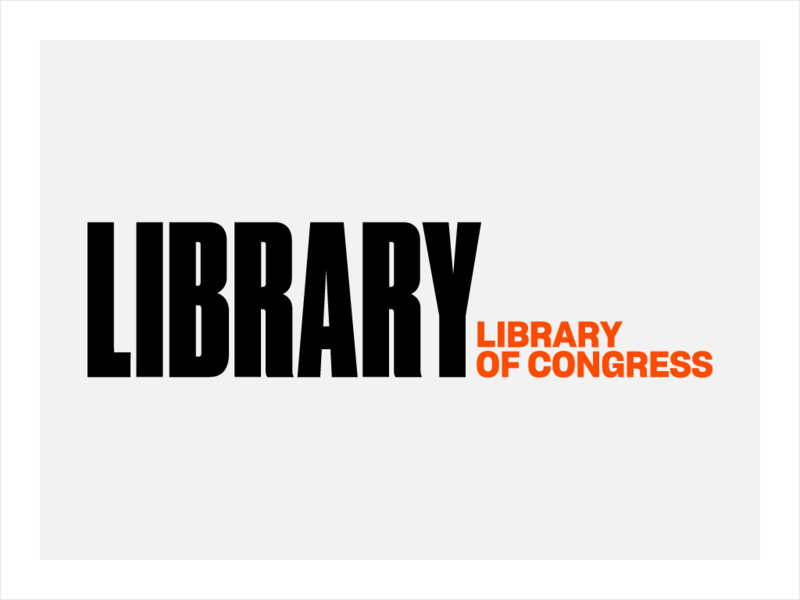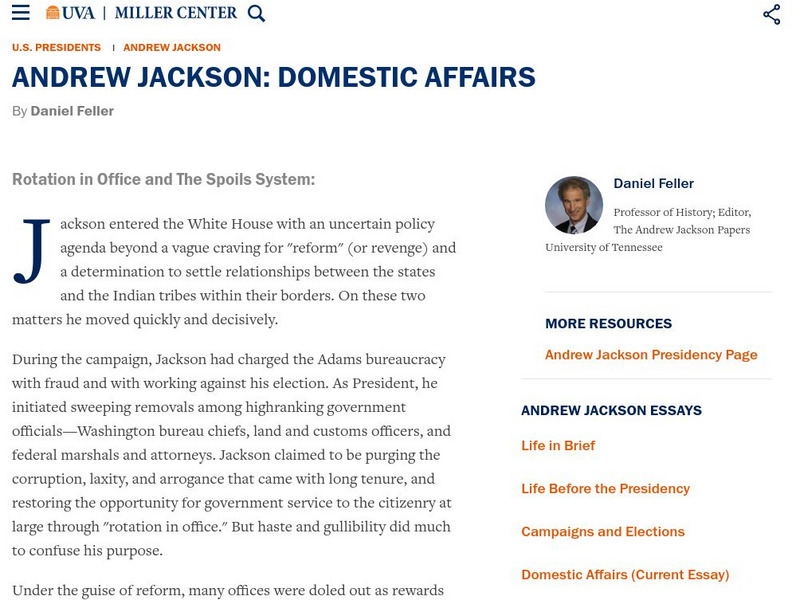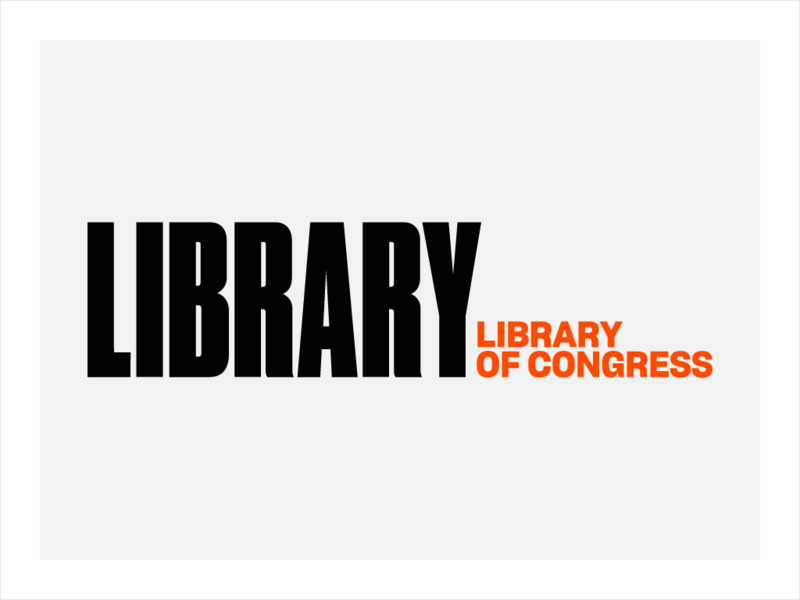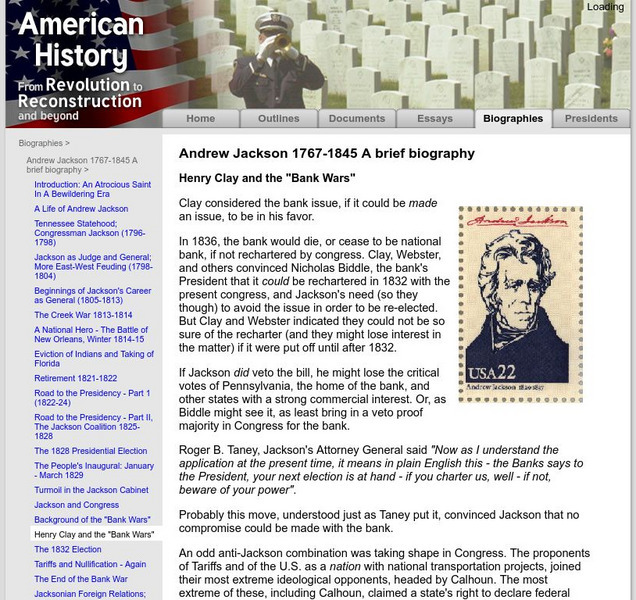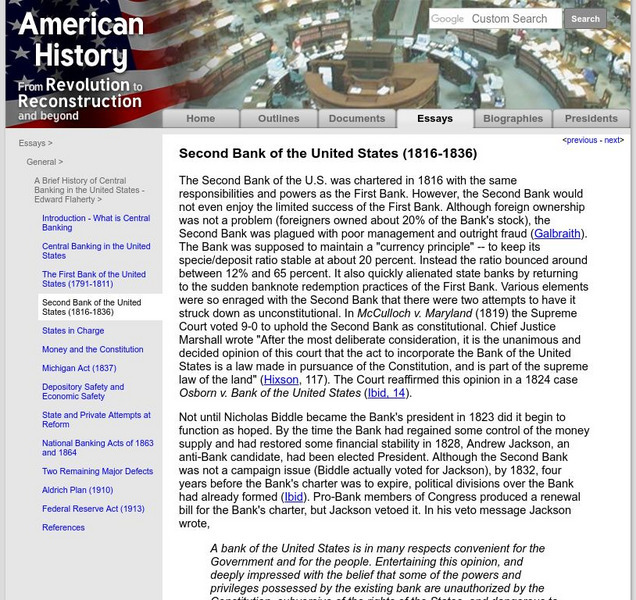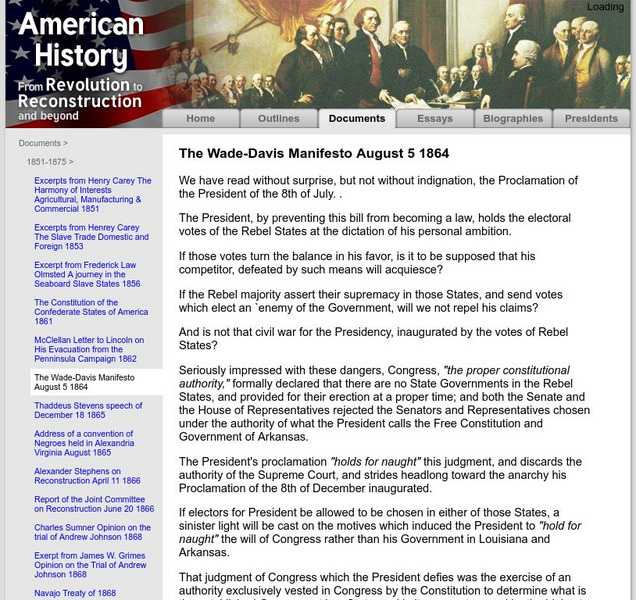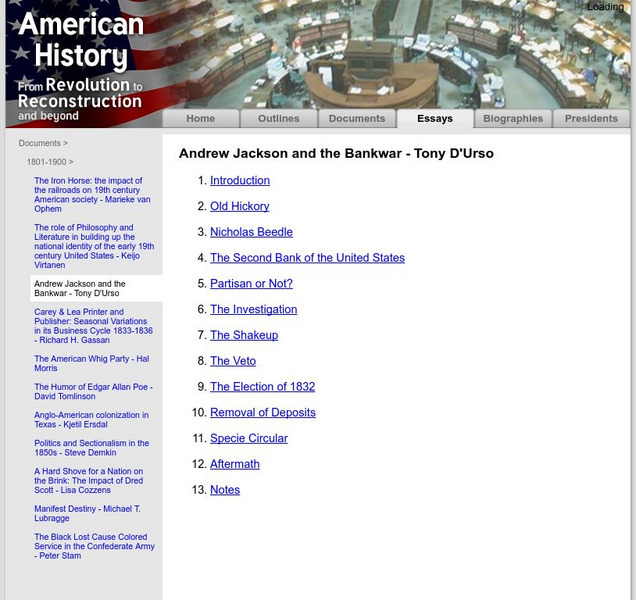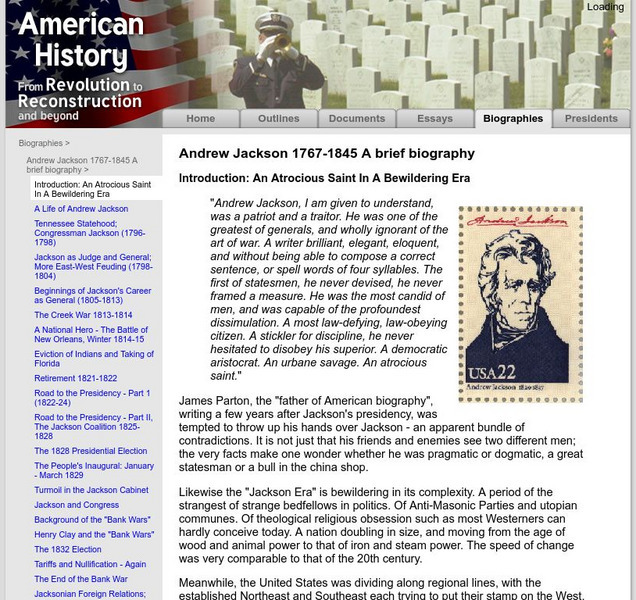American Presidency Project
American Presidency Project: Veto of the Taft Hartley Labor Bill
Primary source document of President Truman's veto of the Taft-Hartley Labor Bill, 1947.
The Dirksen Congressional Center
Congress for Kids: The Legislative Branch: The Veto
Learn about the President's power to veto a bill, and understand how Congress responds when this happens.
University of Groningen
American History: Presidents: Bank Veto Message, July 10, 1832
Here, read Andrew Jackson's "Bank Veto Message," which was originally spoken by Jackson in 1832.
Other
Ethical Culture Fieldston School: Veto of Maysville Road
Here, read Andrew Jackson's "Veto of Maysville Road Bill," in which he defends his 1830 veto.
American Presidency Project
American Presidency Project: Veto of the Second Housing and Urban Renewal Bill
Read the text of President Eisenhower's letter to the Senate in which he lays out his reasons for vetoing a housing bill. See the specifics he gives that he feels would improve the bill and allow him to sign it.
University of Groningen
American History: Essays: Andrew Jackson and the Bankwar: The Veto
Despite prudent advice to the contrary, Nicholas Biddle, head of the Second Bank, applied to recharter the bank on the eve of Andrew Jackson's bid for re-election in 1832. Once elected, Jackson vetoed the request.
US Senate
Regular Vetoes and Pocket Vetoes: An Overview [Pdf]
This site explains how regular, pocket, and overriding vetoes work.
Library of Congress
Loc: Line Item Veto
Library of Congress' database listing for the Line Item Veto Act (1996). Includes the mechanics of how it would work, the history of the Act, and its eventual striking down by Supreme Court's decision. Very brief.
Social Studies for Kids
Social Studies for Kids: The Presidential Veto
The President of the United States has extraordinary power over the shaping of federal laws. He or she can veto any law passed by Congress.
History Tools
History Tools: Andrew Jackson Veto Message Regarding the Bank of the u.s. [Pdf]
Historical primary source written in a message by Andrew Jackson explaining why he is opposed to a national bank in the U.S.
University of Virginia
Miller Center at Uva: u.s. Presidents: Andrew Jackson: Domestic Affairs
A comprehensive overview of the domestic issues facing Andrew Jackson in his presidency, from the "spoils system" to veto of the bank recharter to his Indian removal policy.
Library of Congress
Loc: Law: War Powers
Find the reasoning behind the War Powers Act, passed over President Nixon's veto in 1973. Presidential actions taken during the Vietnam War were the impetus for Congress to make a declaration of war more codified. See the times...
University of Groningen
American History: Biographies: Andrew Jackson: Henry Clay and the "Bank Wars"
Part of a biography of American president Andrew Jackson, this article surveys Jackson's veto of the Second Bank of the United States and the political intrigue involved in that.
US Government Publishing Office
Ben's Guide to u.s. Government: President's Legislative Powers
An easy-to-understand discussion on the actual legislative powers of the president and the veto. Includes related links.
University of Groningen
American History: Essays: Second Bank of the United States
This resource provides a short description of the Second Bank of the United States. It contains a part of President Andrew Jackson's veto of the renewal bill for the Bank's charter.
Digital History
Digital History: Andrew Jackson's War With the Bank of the United States [Pdf]
In a case of "be careful of what you wish for," President Jackson's veto of the rechartering of the Bank of the United States had many ramifications. Read about the banking issues in Jackson's second administration, his on-going war with...
Independence Hall Association
U.s. History: Radical Reconstruction
Read about the frustration the Radical Republicans in Congress had with the Reconstruction plans of Andrew Johnson. Find out what legislation they were able to pass over Johnson's veto, and how they attempted to protect emancipated...
Social Studies for Kids
Social Studies for Kids: How a Bill Becomes a Law
Follow a bill, from its introduction to Congress to its signing by the President. Find out about all the steps in between, including the presidential veto and the Congressional override.
University of Groningen
American History: Documents: The Wade Davis Manifesto August 5 1864
View the complete text of the Wade-Davis Manifesto which describes a bill proposed for the reconstruction of the South. The bill passed both houses but was then vetoed by President Lincoln.
Yale University
Yale Law School: The Papers of George Washington
Links to the texts of George Washington's important papers and speeches including both inaugural addresses, annual messages, messages to Congress, proclamations, veto messages, and his Farewell Address.
The Dirksen Congressional Center
Congress Link: Lesson Plans
The Dirksen Congressional Center provides abundant lesson plans on all aspects of the US Congress and the US Constitution. All lessons contain time frames, objectives, and links to material, and are built around Bloom's taxonomy.
University of Groningen
American History: Essays: Andrew Jackson and the Bankwar
This site contains an index of several articles pertaining to Andrew Jackson and his dealings with the Second Bank of the United States and his fiscal policies.
University of Groningen
American History: Biographies:andrew Jackson Altrocious Saint in Bewildering Era
Here, read a summary of the life and career of Andrew Jackson, the 7th U.S. President. Part of a larger site about Andrew Jackson's presidency.
US National Archives
Our Documents: Wade Davis Bill(1864)
On this site you can view an original copy of the document and and also an easy to read version of the complete text. There is also a brief summary of the history behind the bill.

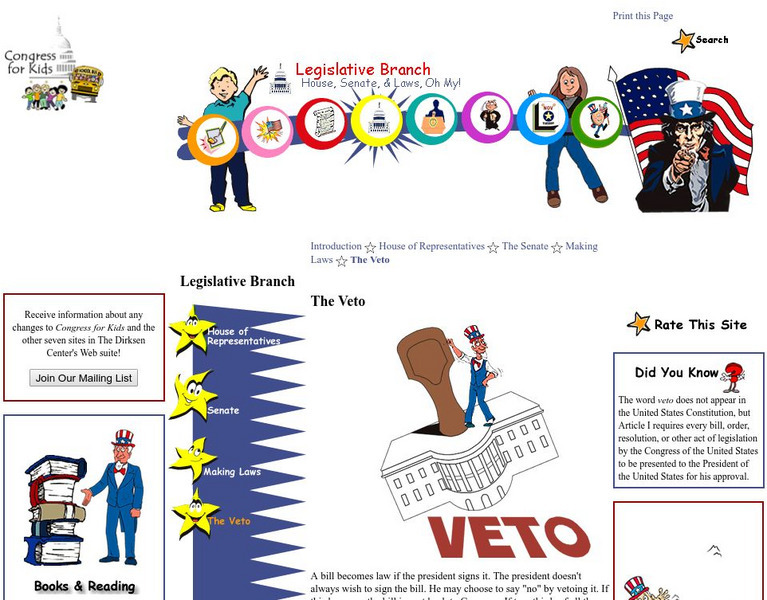
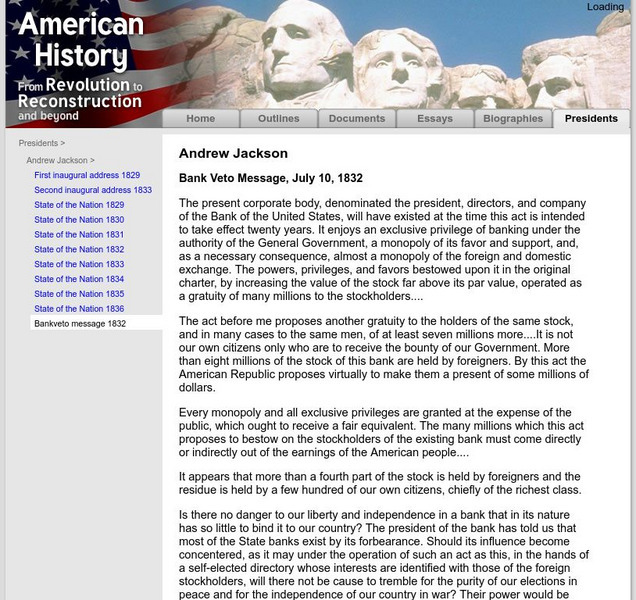
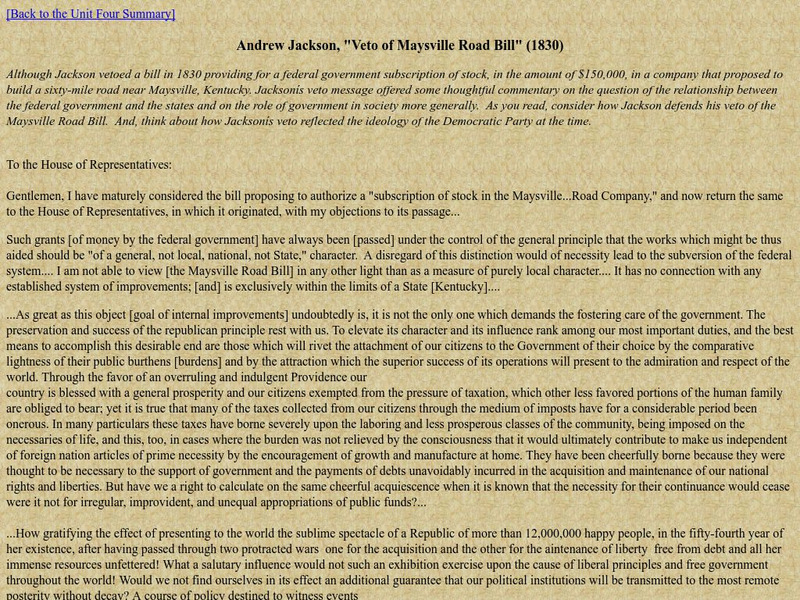


![Regular Vetoes and Pocket Vetoes: An Overview [Pdf] Handout Regular Vetoes and Pocket Vetoes: An Overview [Pdf] Handout](https://d15y2dacu3jp90.cloudfront.net/images/attachment_defaults/resource/large/FPO-knovation.png)
